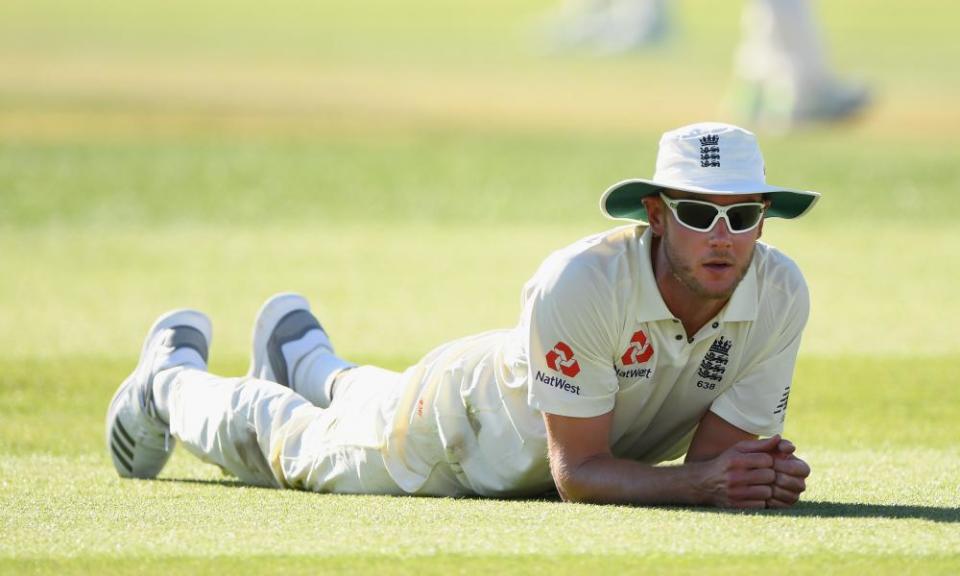England hope Stuart Broad demotion will bring benefit of more balanced attack

It was a decade ago in Wellington that Jimmy Anderson and Stuart Broad first appeared together in a Test match. After a surprising defeat at Hamilton in the opening Test on that 2008 tour the captain, Michael Vaughan, and coach, Peter Moores, decided to drop Matthew Hoggard and Steve Harmison. The next generation, personified by Anderson and Broad, was given its head and took its chance well enough. England won the next two Tests – though it was actually Ryan Sidebottom who took most of the wickets.
In Auckland this week Anderson and Broad are still going while Sidebottom contemplates his new coaching position at Surrey. But are they still going strong? On the evidence of the Ashes series it is the younger man who may be creaking. Anderson was England’s best bowler against Australia; meanwhile Broad, four years the junior partner, strove hard and struggled, taking 11 wickets in the series at 47 apiece.
The indications are that Joe Root is planning appropriately. Expect Broad to be denied the new ball for the first time in years in Auckland on Thursday when England play in the first floodlit Test match on New Zealand soil. This is not such a dramatic handing over of the baton as the dropping of Harmison and Hoggard 10 years ago but it is a reminder that a wonderful partnership is not going to last forever.
Root’s plans make sense. He needs the next generation of bowlers to start taking more responsibility. If Chris Woakes is fit in Auckland, he will probably share the new, pink ball with Anderson while Broad, his pride slightly dented, waits in the wings eager to be given an early bowl. This should work on several levels.
Strategically England must plan ahead and they must abandon any lingering thoughts of a hierarchical approach to the possession of the new ball. This should rarely be a consideration in any team but it often is. Admittedly for West Indies it worked quite well in the 80s since Joel Garner felt obliged to bowl faster when he was given the new ball alongside Malcolm Marshall.
Tactically it is also a good idea to have Broad at first change. In the Ashes Anderson and Broad shared the new ball, which meant they often bowled in tandem not only at the start but also at other times through the innings. So an unhelpful pattern emerged. For an hour England’s most experienced duo were in harness and they would, at least, impose pressure on the batsmen; in the second hour with the relative novices together that pressure would reduce significantly. It might be beneficial to mix the pairings – and the generations – up.
Moreover Broad might well operate better as a mean first-change option. He will not feel so obliged to strain for pace, which seldom helps him. And rather than sulkinghe he delights in proving people wrong. He says he is trying to rediscover his away-swinger, a good idea but a difficult one to fulfil. Recently against left-handers Broad has bowled mostly from around the wicket and has attempted to angle the ball towards the slip cordon; against right-handers with his action ever more open-chested the ball has tended to slant in all the time.
In Auckland England’s team should be stronger than at Sydney in January when Woakes was injured and Ben Stokes unavailable. The presence of Stokes gives the batting much more depth, assuming that England play the extra batsman on the basis that runs are harder to come by in pink-ball Test matches. Inevitably he will keep us all on our toes though it would be remarkable if he is able to bowl his usual quota of overs. More anonymously Jack Leach is joining an England Test squad for the first time after the discovery of Mason Crane’s stress fracture, another arrival that enhances Root’s options – at least in Christchurch, the venue of the second and final Test.
Some of the batsmen are battling to stay in the team. By his own admission Mark Stoneman has not done enough to nail down a place at the top of the order while James Vince cannot exasperate for much longer. Looking the best batsman in the side for half an hour may have helped him keep his place in Australia but now only runs count. If Stokes is unable to bowl much at all in Auckland it is possible Vince will have to give up his place to Craig Overton anyway.
After almost five months on the road England face a tough task. The Kiwis will seize their chance if England’s multi-format players are too jaded or their Test specialists too rusty. Kane Williamson, Ross Taylor and Trent Boult are three obvious matchwinners but there are plenty of highly competitive cricketers alongside them.

 Yahoo Sport
Yahoo Sport 





































